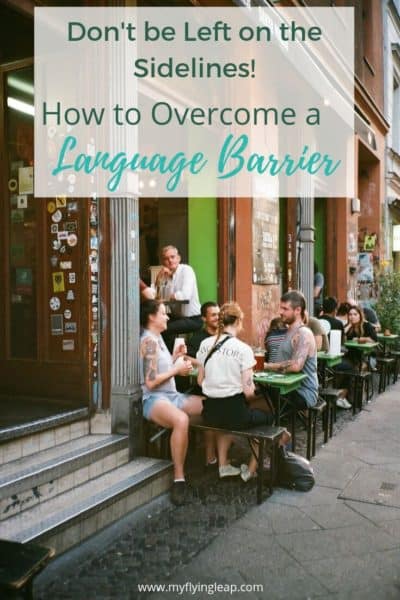14 Tips for Overcoming a Language Barrier When You Travel
One of the first things you may notice when you visit a new place is that there are people all around you speaking, yet you don’t understand a word. Overcoming a language barrier when traveling can be confusing and stressful.
Trying to get grounded after a long flight when you land in a foreign country where you don’t speak the language can be overwhelming. You need to find transportation to your hotel or accommodation and orient yourself to this new place.
Maybe you’re picking up a rental car, or maybe you’re taking a taxi or public transportation. Or maybe you’re trying to navigate. And this can carry on during your trip, not just when you first arrive.
Even if you know a little bit of the language spoken where you’re traveling, it can still be a challenge. Trying to order food or get directions isn’t easy!
This article provides 14 strategies for overcoming a language barrier when you travel.

Some links in this article may be affiliate links, which means that if you purchase through them, I receive a small commission. This will never cost you extra. Please read the disclosures to learn more.
How to Overcome Language Barriers
It can be difficult to communicate in a country where you don’t speak the language. This is especially true when the letters are different, so you don’t recognize anything in writing and can’t read it aloud either.
Though barriers in communication are a challenge, there are strategies to overcome language barriers so you can express yourself to get your needs met. Learning how to overcome language barriers in communication is a top tip for enjoying yourself when traveling.
You May Also Like The 11 Best Tips for Travel I Wish I Knew Earlier
You may not be ready for a conversation, but that’s not necessary when you’re trying to order food in a restaurant, check into a hotel, or purchase something at a market or store.
Being flexible and creative will go a long way along with these 14 ways to overcome language barriers.

1. Learn a Few Key Words and Phrases
It’s always a great idea to at least learn a handful of words and phrases for any country you visit. Here is the list I usually aim for:
- Hello
- Goodbye
- Please
- Thank you
- Do you speak English?
- Bathroom
- Water (and red wine)!
At a minimum, it demonstrates politeness and that you are showing an interest in attempting to be able to communicate. If you’re lucky, you may find some people who speak English, particularly in places tourists go, like restaurants and hotels.
In some places, like Paris, for example, I found if you don’t at least make an effort to open a conversation in French, many people won’t talk with you. In my experience, even a very badly-spoken “Parlez-vous Anglais?” (Do you speak English?) It helped.
I joked that I butchered the beautiful language so badly that they felt compelled to speak English if they could. Overcoming a language barrier sometimes means being willing to laugh at yourself.
Language Pro Tips
I have found it helpful to bring a small phrasebook with me when I travel to help prompt me to some of the more common phrases when I get stuck. And it shows you’re making an effort!
I love the Rick Steeves phrasebooks for European languages like Spanish, French, Italian, German, and others. Lonely Planet makes some great phrasebooks for European countries and many others like Thailand, China, and Russia.
2. Pantomime When You Need to
Remember the game Charades? One person picks a card and has to act out a word or phrase. It’s not easy, but it’s quite helpful when dealing with a language barrier.
Are you in a restaurant? Point to a picture on the menu. Are you in a market? Point and gesture for the person you’re trying to communicate with to write a number down on a piece of paper so you understand the cost in the local currency.
Asking for directions? Someone can point you in the right direction.

3. Be Friendly and Expressive
Being friendly and polite goes a really long way. If you are nice and appear to be trying, you have a much greater chance of people being more patient and helping you.
When I went to Colombia, it seemed that whenever I (feebly) attempted to speak Spanish, someone would approach me who spoke better English than I spoke Spanish to help me.
Politeness counts as well. “Hey, do you speak English?” may not be the best way to ask for help. At least even saying “hello” in the local language can be a more polite open than a very casual one. In many countries, casual speech with a person you don’t know isn’t appreciated.
4. Consider Context
When your words are failing you, and you can’t bridge the language barrier, sometimes context can be a big help. An easy example is when you walk up to the front desk at a hotel.
Chances are, the person is saying something like, “Hello, would you like to check in?” or “Hello, how can I help you?” A smile with a wave and providing your name may be just the trick.
Even better would be to say “Hello! Do you speak English?” in the local language.
5. Simplify
Focus your words on expressing your thoughts. For example, you can say to someone, “Would you like me to take your picture?” or “Can you take my picture?” Or, you can simply say, “photo?” The second is much easier to understand, especially if someone is not a native speaker.
Now, if you also pantomime taking the picture, gesturing with a smile, that person will have no misunderstanding of your intent. If you keep what you say simple and basic, whether in your native language or the language that is spoken where you are visiting, you’ll have a much better chance of getting your needs met.
6. Write it Down
If someone is telling you something, for example, giving you a name or a street address, and you can’t quite make it out, ask them to write it down. You may be able to understand better, and it gives you the option to look it up or to ask someone.
When I was traveling in Colombia, I caught a cold. I always overdo it when I travel solo, and this was no exception.
The receptionist at my hotel spoke some English, but I didn’t expect a pharmacist to. So, I explained to Marcela what medications I wanted, and she wrote them down for me so I could show them to the pharmacist.
In the past, I have tried pantomiming my needs, and that can be good for a laugh if you’re in the mood. (Try pantomiming “insomnia” for fun or any other medical condition)!
7. Try and Be Ready to Laugh
An effort goes a long way when dealing with a language barrier. Do your best to communicate in any way you can, whether with words or gestures. Remember, you are in their country.
I took two years of Spanish in high school, which was… well, quite a few years ago! I know some words and phrases, though I’m horrible at attempts to conjugate verbs. You know what? I try anyway.
Even if I know the words I’m saying don’t make a sentence and are bad grammar that a first grader could do better at, I still say the words. The person at least understands what I am saying, and I’m demonstrating an effort.
It’s okay to laugh when you say something wrong or completely mispronounce! I have shared many great deep-belly laughs with people I just met because I realize I said something very wrong or even just that what I’m saying is pretty awful.
There’s no better way to make a connection with someone than to be real and to laugh. Who doesn’t appreciate that?
8. Ditch the Slang
Even though someone may speak some English, that doesn’t mean they understand everything in English. Phrases like “What’s up?” and “I’m pretty good” can be quite confusing for someone who is not a native English speaker.
Instead, stick to simple ways of saying what you want to that aren’t slang, so people are more likely to understand you.
9. Speak Slowly and Enunciate
There’s always that joke that when you travel to other countries, speak slowly and loudly and add an appropriate accent, and people will understand what you’re saying. This is kind of like the concept of Spanglish in the United States.
I was on the receiving end of someone who spoke very slowly and talked really loudly at me in his language as I wasn’t understanding. Nope, I still didn’t understand what he was saying!
Though you don’t have to raise your voice, speaking slowly and being sure to speak clearly and enunciate can be really helpful with communication. I know when I try to listen to a Spanish speaker, I have a hard time as it’s usually spoken so fast.
So, I often ask when I’m in Spanish-speaking countries, “despacio, por favor,” or slowly, please (probably in pretty horrific grammar, but as I mentioned above, the person I’m trying to speak with will at least understand me).
Sometimes, that alone helps me to make out what they are saying enough that I can communicate.
10. Google Translate
I will say Google Translate is a game-changer. You can type or speak into this app, which will translate into your chosen language. Where I used to be able to express basic needs, now I can actually have a conversation with someone with minor delays.
This is only effective if you have Wi-Fi on your phone and a data plan that works in the country you’re visiting. (Though, you do have the ability to save some words and phrases for later use when you have a connection).
Having had it in most places I have visited recently, it’s a major gaping hole when I haven’t had the ability to use Google Translate.
This is a tremendous help and one of the most important apps for travel, in my opinion.
11. Take Lessons
If you are planning to spend some time in another country, you can look into local language classes. It’s a good way to meet people as well as to learn.
If you want some help with learning the language or really want to up your game, you can get one-on-one online tutoring sessions through italki. You choose your teacher and take lessons whenever it’s convenient for you. And the costs vary by teacher.
You benefit as you’re not just reading from a book or listening to a recording but actually interacting in real-time with someone fluent in the language you want to learn. Pretty amazing!

You can also ask a local friend if you know someone living there or who speaks the language. This is a great way to learn and practice. And you can ask someone for help.
Even if you only know a few words, you can use them along with context and pantomiming to get your thoughts/needs across and ask for help with the right words to say. I have asked for many impromptu language lessons, and people usually appreciate the effort!
Another option is to get an app. Duolingo and Babbel are two great apps that I have used to help me learn some words and phrases that will be useful when I travel. They give you the opportunity to both see the words and hear the pronunciation, which is really helpful.
12. Offer to Practice
For people who are native English speakers or even are fluent in English, you offer a great opportunity to help others practice. Many countries view English as the universal language, so it’s desirable to learn it.
And, believe it or not, English is not an easy language to learn. Most rules in English are broken in certain scenarios, so that makes it quite difficult. This video about English pronunciation really demonstrates this concept well:
So many times when I have traveled, someone will attempt English and say that their English is not very good. It makes me laugh as every single time this happens; their English is much better than my attempts at whatever language they are speaking!
So I offer to help them if they would like, and that shifts it, so they don’t feel as embarrassed about their English-language skills. I help them learn, and it’s a wonderful feeling. Overcoming a language barrier does take effort for all involved.
13. Be Patient
Overcoming a language barrier can be challenging! Trying to communicate isn’t easy when you don’t speak a language at all or don’t understand it. It’s not easy, even when you understand a little of the language.
People put a lot of pressure on themselves trying to navigate this, and it can be stressful. So, keep in mind, whether you are in the country where your native language is spoken or not, people are trying. Give them a break, and cut yourself some slack as well.
Traveling to other countries where I don’t speak the language has made me much more understanding of people with communication challenges in my own country. Now, I appreciate how hard it is trying to communicate in a language other than your own. And I applaud their effort.
14. Practice Before You Go (and After, Too!)
Taking lessons and talking with people you know aren’t the only ways to reinforce language learning. There are groups you can join to help.
On sites like Meetup, search in your area for language-learning groups. I found one in my area for German and Spanish. You often will meet at a restaurant, coffee shop, or something similar.
Though you can speak your native language, you’re encouraged to speak in the language you’re learning. Why not, after all?
And everyone is learning the same language, though they may be at different levels. People may be more patient with you, so you feel more comfortable trying.
Why You Should Consider Learning Another Language
We connect to other people through conversation. Whether it’s while you’re traveling or at home, at a restaurant, or in a park, talking is how we engage other people. It’s how we get to know each other. It’s how we express our needs and interests and what we can do for others.
That’s not to say that you can’t connect without speaking. I have had many “conversations” pantomiming and have gotten my needs across when I’m traveling. But, when you can speak with someone, it helps you to build and deepen a connection. It’s a great thing when you’re traveling or otherwise, really.
Learning another language is also a really great and constructive way to use your time when you can’t travel for any reason. You get to stretch yourself and engage your mind in a way you may not be used to. There are so many great apps and tools that you can use, so it’s a matter of figuring out what works best and setting aside the time.
So, instead of turning on Netflix, consider Duolingo (or another language-learning app) instead. Or talk with a native speaker live with Italki. Find someone to practice with.
The next time you travel to a country speaking the language, you’ll have a whole new perspective. You don’t need to be fluent to make an impression and to be able to connect with someone.
You May Also Like Things to Do When You Can’t Travel
Overcoming a Language Barrier
Dealing with a language barrier can sometimes be one of the most challenging aspects of traveling. Particularly when traveling in countries where the letters are completely different, so you don’t have the option to read a word to ask for help.

Working on overcoming a language barrier can be a great way to really get to understand the culture of a country and to make new connections. It’s something to keep in mind when in your own country and you encounter it there as well.
The great part of this is it’s not only applicable for travel—these tips help you overcome all language barriers of communication. These tips help you overcome language barriers in the workplace and wherever you are.
Do you get impatient and think the person is in your country and should learn to speak the language, or do you try to help them to the best of your ability? There’s a lesson to be learned here for all.
Travel opens our eyes and helps us learn and grow as human beings. We don’t need to be perfect. We just need to try.
You Might Also Like
- 11 of the Best Tips for Travel: What I Wish I Knew Earlier
- 10 of the Best Reasons for Traveling
- How to Prepare for Safe Travels Before you Go
- 15 of the Best Apps for Travel During a Trip
- How I Plan My Trip to Travel Internationally
Like it? Pin it!








This is undoubtedly the best thing that I’ve come across today in the internet. It was a long time that I have been thinking on this topic but I couldn’t satiate my quench for knowledge through any post that I read. However, today that I came across your article, I seem to have learnt a lot and I have also gained enough knowledge on this topic. Thanks once again.
Thank you! I’m so glad it was helpful.